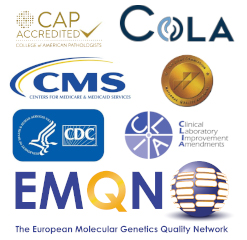Prostate Cancer
WHY WE’RE DIFFERENT
EXCLUSIVE PARTNERS
- Perkin Elmer
- Sngene Lab
- Genique lifesciences

Prostate Cancer
Prostate cancer is common amongst middle aged or older men and causes certain cells in the prostate to become abnormal and multiply without regulation to form a tumour.[1] The level of severity and outcome of individuals whom are diagnosed with prostate cancer varies broadly. Prostate cancer that is diagnosed in its early stages can usually be successfully treated, with some tumours growing so slowly that they may never cause any health issues during the individual’s lifetime. However, in other men, prostate cancer is much more aggressive, growing and spreading quickly – requiring treatment straight away.[1] This is where genomic testing can help.
In most cases, the genetic changes are developed throughout a man’s lifetime and exist only in certain cells within the prostate. These genetic changes, which are known as somatic mutations, are not hereditary. An estimated 10% of all prostate cancers are hereditary and cluster in families.[1] Hereditary prostate cancers often tend to develop earlier in life, in comparison to sporadic (somatic) prostate cancers, and are associated with inherited gene mutations. These changes, which are more commonly classified as germline mutations, are typically inherited from a parent.[1] Somatic mutation testing is used to help determine appropriate targeted therapies, whilst knowledge of germline mutations can help in the interpretation of the results.
The power of genomic testing in Prostate Cancer
Genomic testing can be used to analyse the DNA of your tumour and may identify the genetic mutations that are unique to your cancer. Identifying these mutations is the key to developing personalised treatments.
Clinical trials have shown that personalised therapies, developed from genetic testing of tumours, are the most effective way to improve treatment outcomes. Patients undertaking therapy as a result of genetic testing are shown to have longer progression-free, higher response rates to treatment and overall greater survival rates. [2-4] The cost of investing in genomic testing to obtain a complete and accurate diagnosis is small, compared to the time and money that may be wasted on generic or ill-chosen therapies. Genomic testing provides a powerful diagnostic tool, and every patient deserves an accurate diagnosis.
Depending on the type of testing done, a comprehensive genomic analysis may provide information on potential therapeutics, development of resistance to treatments, prognosis and disease tracking, and may provide access to clinical trials and new treatments. Genomic sequencing of your prostate cancer may identify:
- TP53mutations, which are associated with higher resistance to some chemotherapy, helping to guide treatment choices. [5-7]
- Identification of mutations in the AR, ETSand PTEN genes (frequently found in 40% – 60% of prostate cancer cases), as well as TMPRSS2-ERG and SLC45A3-ERG gene fusions may help to guide treatment choices.[8]
- Germline and/or Somatic mutations in BRCA1, BRCA2, ATM, PALB2, FANCA, RAD51Dand CHEK2 may help for enrolment in clinical trials testing PARP inhibitors, such as rucaparib and olaparib.[9]
- Many other mutations in >120 genes* that will help guide your treatment by highlighting potential drug targets or drug resistance and prognosis, as a small percentage of tumours will have rare mutations that may be targetable with specific treatment options.
What testing options are available?
Codex Pro Plus Solid Tumour Analysis
- The Comprehensive PlusSolid Tumour Analysis is a comprehensive cancer panel that may detect DNA mutations and RNA fusions across >120 genes that are commonly indicated in a range of cancer types.
- Your personalised report will provide you with the genetic characteristics of your tumour, which may provide information on potential therapeutics, resistance to therapeutics, prognosis and clinical trialsor new treatments you may be able to access.
- This analysis also covers Copy Number Variations and Tumour Mutational Burden, which can indicate your likely response to Immune Checkpoint Inhibitors.
Cell-Free Tumour DNA (ctDNA) Testing and Tracking
- Tumours may release small fragments of DNA (ctDNA) into the bloodstream, which may contain identical mutations to those identified in the primary tumour.
- As ctDNA is released into the bloodstream, this allows for a liquid biopsy to be performed from a blood draw. This may eliminate the need for invasive procedures to obtain samples, such as biopsies, which can be painful for patients or may not be possible due to the size or location of the tumour.
- ctDNA can be tracked over time to monitor your response to treatment and the development of resistance to treatment. ctDNA testing can also be used to check for residual cancer following treatment and can reflect tumour size and burden more accurately than other diagnostic techniques.
References
- Prostate cancer. (2019). Retrieved 30 October 2019, from https://ghr.nlm.nih.gov/condition/prostate-cancer#genes
- Jardim, D. L., M. Schwaederle, C. Wei, J. J. Lee, D. S. Hong, A. M. Eggermont, R. L. Schilsky, J. Mendelsohn, V. Lazar and R. Kurzrock (2015). “Impact of a Biomarker-Based Strategy on Oncology Drug Development: A Meta-analysis of Clinical Trials Leading to FDA Approval.” J Natl Cancer Inst 107(11).
- Schwaederle, M., M. Zhao, J. J. Lee, A. M. Eggermont, R. L. Schilsky, J. Mendelsohn, V. Lazar and R. Kurzrock (2015). “Impact of Precision Medicine in Diverse Cancers: A Meta-Analysis of Phase II Clinical Trials.” J Clin Oncol 33(32): 3817-3825
- Subbiah, V. and R. Kurzrock (2016). “Universal genomic testing needed to win the war against cancer: Genomics is the diagnosis.” JAMA Oncology 2(6): 719-720
- Petitjean, A., M. I. Achatz, A. L. Borresen-Dale, P. Hainaut and M. Olivier (2007). “TP53 mutations in human cancers: functional selection and impact on cancer prognosis and outcomes.” Oncogene26(15): 2157-2165.
- Mogi, A. and H. Kuwano (2011). “TP53 mutations in nonsmall cell lung cancer.” J Biomed Biotechnol2011: 583929.
- Govindan, R. and J. Weber (2014). “TP53 mutations and lung cancer: not all mutations are created equal.” Clin Cancer Res20(17): 4419-4421.
- Robinson, D., Van Allen, E., Wu, Y., Schultz, N., Lonigro, R., & Mosquera, J. et al. (2015). Integrative Clinical Genomics of Advanced Prostate Cancer. Cell, 161(5), 1215-1228. doi: 10.1016/j.cell.2015.05.001
- Cheng, H., Sokolova, A., Schaeffer, E., Small, E., & Higano, C. (2019). Germline and Somatic Mutations in Prostate Cancer for the Clinician. Journal Of The National Comprehensive Cancer Network, 17(5), 515-521. doi: 10.6004/jnccn.2019.7307
